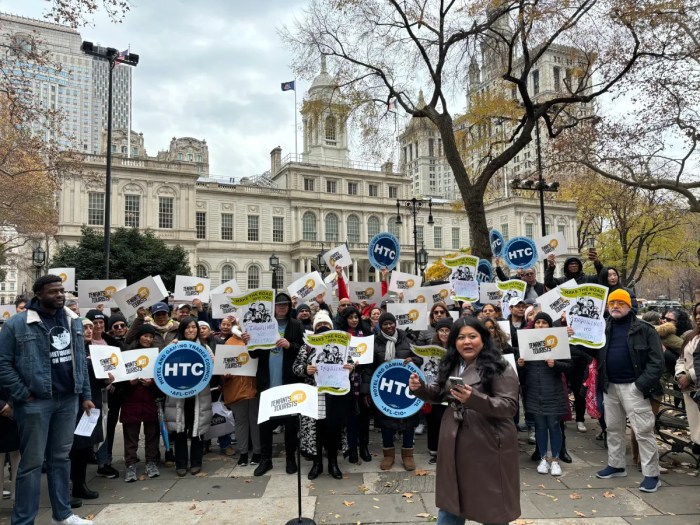By Steve Mosco
Assemblyman Mike Miller (D-Woodhaven) retained his Assembly seat after handily defeating political newcomer Etienne David Adorno in the primary election Thursday.
The assemblyman bested his opponent by 70 percent to 30 percent with 87 percent of the vote counted in the 38th Assembly District, according to CBS News, and punched his ticket to the November general election, where he is running unopposed.
The 38th Assembly District includes parts of Woodhaven, Glendale, Ridgewood, Richmond Hill and Ozone Park.
“This was an important election — one in which the people sent a powerful message,” a beaming Miller told a large crowd with fellow Democratic legislators from Queens. “They want me to come back for another two years and we’ll be back to work tomorrow at 9 a.m.”
Miller maintained throughout his campaign that he was running on his record and experience, something he felt the upstart Adorno was lacking. Miller, a Glendale resident, cited raising the minimum wage as his key issue, along with improving the quality of life in Woodhaven, in particular.
Miller was first elected to District 38 in 2009 in a special election to fill the seat vacated by Anthony Seminerio. He overwhelmingly won a re-election bid in 2010.
Adorno, a 27-year-old from Woodhaven, is a member of the Woodhaven Block Association and serves on the Consumer Affairs and Public Safety Committee for Community Board 9. Adorno took leave from his job as budget liaison for Councilman Robert Jackson (D-Manhattan), but plans to return to that position now that the election is over. Miller received backing from various unions as well as several Latino elected officials, including U. S. Rep. Nydia Velazquez (D-Ridgewood), state Sen. Jose Peralta (D-East Elmhurst) and Assemblyman Franciso Moya (D-Jackson Heights).
Adorno ran his campaign with virtually no endorsements, which he touted as proof he was running a “no strings attached campaign.”
“Our government was put in place to protect our best interests, and some of our elected officials have appeared to forget that when they get into office,” said Adorno when he announced his campaign in July. “I’m tired of being told one thing during election time, only to see it fall through when the campaign is over.”
Miller said his time spent in the state Assembly will enable him to make positive strides for his constituents.
“Three years’ experience doing the job of an assemblyman counts for a lot,” said Miller, adding he has volunteered within the community in various capacities for 25 years. “Coming into this job, unless you come in as a sitting Council member or you had another elected office, there is a lot to learn.”
Miller stopped at PS 91 in Glendale to cast his ballot Thursday and greet a few of the voters on Primary Day.
“I’m very confident,” said the assemblyman of his chances against his young opponent, Adorno. “The voters know I represent them and will continue to do so.”
Dermot Smyth, Queens political action coordinator for the United Federation of Teachers, said Miller represents the hardworking men and women who are the backbone of the district.
“The people need a guy up there in Albany who are going to be there voice,” said Smyth. “Mike has the experience to do what needs to be done.”
Inside the polling site at PS 91, election coordinator Catherine Murawski said a relatively high voter turnout surprised her, particularly since the primary was moved from the traditional Tuesday slot, the same day as Sept. 11 this year, to a Thursday.
Murawski said a steady flow of voters came in throughout the morning and as of noon, they had cast 104 total votes. The election coordinator also said she expected the numbers to jump after people got out of work in the evening.
“It’s a beautiful day and once people realize it’s actually a primary election day, they are going to come out,” she said.
Murawski said no voters complained about the size of the print on the ballot, but she believes if there were more races, the voters would complain.
“If there was more than one race or if there were policy measures on the ballot, you can bet the print would be a lot smaller,” she said. “And that would be a problem for our older voters.”
One major issue Murawski said had to do with the scanners, the machines that read the ballots. The polling place was issued three machines, but one of them jammed early in the morning and was rendered inoperable for the rest of the day.
“We called the Board of Elections and they said to shut it off and go with two machines,” she said. “I hope they fix it and we get the three we are going to need for the general election in November.






































